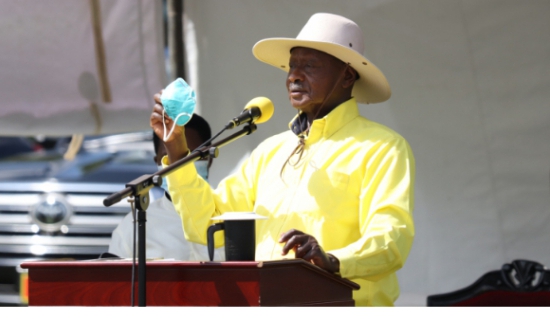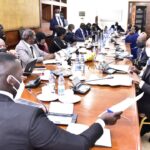The National Resistance Movement ‘NRM’ Presidential Candidate Yoweri Kaguta Tibuhaburwa Museveni has lashed at some selfish leaders who are exposing innocent people to the risk of the deadly Coronavirus by addressing open mass rallies.
The President, who started-off his address by extensively talking about the ongoing COVID-19 pandemic, was addressing NRM leaders drawn from Greater Nebbi including the districts of Nebbi, Zombo, Pakwach, Obongi and Madi-Okollo.
“In this campaign, I have refused to carelessly kill my people by calling them into mass rallies, not that I can’t meet them even along the way; for me am well-protected by wearing a specialized surgical mask N95 plus a face-shield. For them they are not protected like me, some of them don’t have masks, so why would I decide to kill my own people on account of votes?” Museveni sternly said while calling on NRM leaders and other candidates to desist from organising crowds.
“If I gather crowds and let the people get infected and die, what sort of leader would I be? Instead of being a leader, I would be a curse!” he said.
Museveni, who underscored the advantage of scientific campaigns, emphasised that campaign is not all about crowds but the message.
“What matters here is the message you are disseminating to the people. The scientific campaign gives the candidate enough time and space to articulate issues to the people as opposed to the conventional system of holding rallies where you even don’t have enough time to address critical issues and let the message sink to the people, because you will be hurriedly moving to address one rally after another, and you are constrained by time.”
Politics of identity
The NRM Candidate also took the leaders through the strategic problems of Africa and Uganda in particular including slavery, colonialism and the sectarian politics arguing that because of these, Africa has remained backward in the last 500 years.
He said that the independence political parties were formed on the sectarian basis of tribe, religion, social status among others, citing DP which was for Catholics, UPC for Protestants and some Moslems and KY for Baganda royalists.
“Each of these parties was pushing a separate agenda and undermining each other. None of them could capture enough seats to win the required threshold of seats in parliament, for instance UPC had 37 seats; DP 24 seats; and KY had 21, but none of them could even garner 40 per cent of seats in parliament because they had fragmented the people,” he said, adding that the UPC and KY tried to patch-up an alliance which couldn’t stand the test of time.
Talking about the NRM ideology, Museveni elaborated that the NRM came up with the correct ideological line which wasn’t based on identity but usefulness of an individual.
“Even when the NRM started fighting in the civil war, we weren’t talking about identity; we had a nationalistic and pan-African approach. The initial armies we were fighting against were beleaguered by this sectarian disease; the Northerners fighting and killing the Southerners; the Acholi soldiers against the Langi and vice-versa; when Amin took over it was the West Nilers killing the Acholis and Langis because they weren’t of the same tribe, and among others.”
The President said that the NRM enjoys mass popular support because of emphasis on the right ideological message which embraces unity, nationalism, patriotism, and owing to this, the NRM has been able to build a strong government and Army resulting in peace and development.
The President underscored the need to create more jobs by supporting private investors saying that the NRM government, after creating peace, started inviting the Asians who had been expelled by Amin and giving them back their properties.
“We invited back the Asians to reposes their property and re-start businesses and today you can see what these investors have done. Uganda today has over 5,000 factories creating over 700,000 jobs to the locals and solving the problem of shortage of essential commodities including sugar, soap, beer, cement.”
Besides the factories which are employing more Ugandans than the public sector (480,000), Museveni said that investments in the service sector has created 1,300,000 jobs, ICT 300,000 jobs. “We need more factories to employ more of young people, and most importantly, the nature of industrial development shall influence our education and skills development. “Employers will need people who are more skilled to work in factories, hotels, among others.”
According to Museveni, private sector development has enhanced Uganda’s tax revenue from Shs 5billion in 1986 to Shs 21trillion today.
Tomorrow (Saturday), the NRM Candidate travels to Moyo to meet the NRM leaders and flag-bearers, and later address a Radio talkshow translated into Madi.
![]()
























